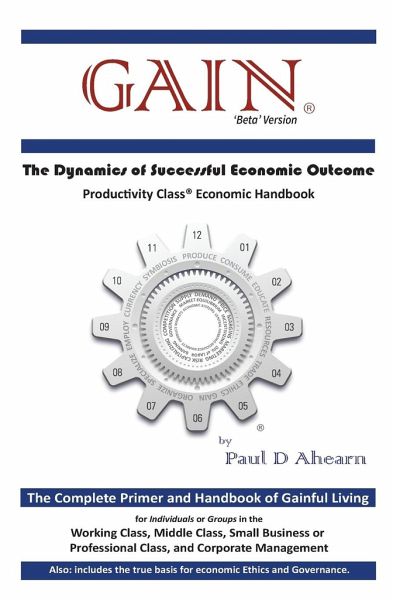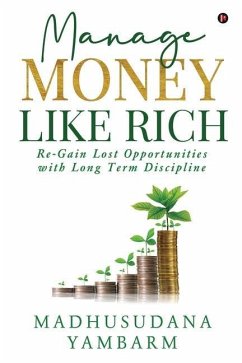
GAIN
The Dynamics of Successful Economic Outcome
Versandkostenfrei!
Versandfertig in 1-2 Wochen
16,99 €
inkl. MwSt.

PAYBACK Punkte
8 °P sammeln!
ECONOMICS IS NOT A HUMAN INVENTION. It is a set of innate human dynamic activities. Materially, all humans survive through this same innate set of fundamental dynamic activities. MATERIAL ASPECT: Every dynamic in human living has its material aspect. In everything we do, we use some material 'thing' to better succeed at that 'function' or 'purpose' and, therefore, that human dynamic. THE HANDLING OF THE MATERIAL ASPECTS OF OUR HUMAN DYNAMICS IS ECONOMICS, AND IS WHAT THE SUBJECT IS ALL ABOUT. CHAPTER ONE: Covers the BASIC PURPOSE of economics and the FIVE PRIMARY AXIOMS that make up the subjec...
ECONOMICS IS NOT A HUMAN INVENTION. It is a set of innate human dynamic activities. Materially, all humans survive through this same innate set of fundamental dynamic activities. MATERIAL ASPECT: Every dynamic in human living has its material aspect. In everything we do, we use some material 'thing' to better succeed at that 'function' or 'purpose' and, therefore, that human dynamic. THE HANDLING OF THE MATERIAL ASPECTS OF OUR HUMAN DYNAMICS IS ECONOMICS, AND IS WHAT THE SUBJECT IS ALL ABOUT. CHAPTER ONE: Covers the BASIC PURPOSE of economics and the FIVE PRIMARY AXIOMS that make up the subject -- including for each: an Economic Theory Statement [why it exists and what it is for]; an Overview; its Characteristics and General Factors. The BASIC PURPOSE of all economic activity [the reason it genetically evolved into existence] is to "secure the material requirements necessary to a) achieve a worthwhile quality of survival, b) successfully pursue the dynamics of living, and c) consistently improve living conditions with acceptable regularity". From rainforest tribes to the most sophisticated civilizations, we all share this same fundamental material drive -- this same BASIC material PURPOSE. The BASIC PURPOSE drive for material needs and wants compel into utility all of the different human mental and physical capacities, functions, and operating activities necessary for material success. These capacities, functions, and activities are postulated and stated in FIVE PRIMARY AXIOMS -- which include within them all of the primary human capacities employed to generate into existence a single 'clockwork' of TWELVE ELEMENTAL ACTIVITIES required to successfully achieve all human material needs and wants. CHAPTER TWO: Covers the TWELVE ELEMENTAL ACTIVITIES of Economics -- including for each activity: an Economic Theory Statement [why it exists and what it is for]; an Overview; its Characteristics and General Factors; and more. By their founding and primary nature, no matter how expanded or sophisticated economic systems or activities may get, these TWELVE ELEMENTAL ACTIVITIES always remain the PRIMARY OPERATING DYNAMICS of all economic activity. Always! And the very doing of this clockwork of interlocking PRIMARY OPERATING DYNAMICS is 'economic activity', and how the productivity of economics is actually accomplished. Always! When these PRIMARY OPERATING DYNAMICS are functioning in a community or society, their very activity generates additional 'subordinating operating dynamics' derived from that activity. We call them, therefore, the DERIVATIVE [or SUBORDINATING] OPERATING DYNAMICS of economics. CHAPTER THREE: Covers the DERIVATIVE OPERATING DYNAMICS of Economics -- including for each activity: an Economic Theory Statement [why it exists and what it is for]; an Overview; its Characteristics and General Factors; and more. This is where all the 'academic' texts on economics begin: SUPPLY, DEMAND, PRICE, MARKET EQUILIBRIUM, etc. If you've studied other texts on economics, you will be familiar with the 'academic theories' -- not necessarily, however, their 'productivity' perspective. After all, all of these dynamics are 'derived from' and must 'subordinate to' the success of the PRIMARY OPERATING DYNAMICS of economic activity not included in those other 'academic' based texts. Economics is not a 'study of' something, nor is it a set of 'academic theories'. Economics is an active, dynamic activity. GAIN, therefore, establishes 'producer class productivity economics'. GAIN is a handbook for applying the 'cause-and-effect' and application principles of 'gainful economic productivity' to your life, your business, even your society.













![Annual Statement of the Trade and Commerce of St. Louis ...: Reported to the Merchants' Exchange ... by ... [The] Secretary Cover Annual Statement of the Trade and Commerce of St. Louis ...: Reported to the Merchants' Exchange ... by ... [The] Secretary](https://bilder.buecher.de/produkte/68/68743/68743527n.jpg)
